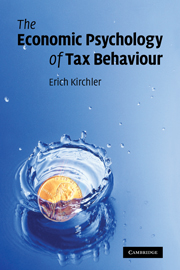Book contents
- Frontmatter
- Contents
- List of figures
- List of tables
- Foreword
- Preface
- 1 Introduction
- 2 Tax law, the shadow economy and tax non-compliance
- 3 Social representations of taxes
- 4 Tax compliance decisions
- 5 Self-employment and taxpaying
- 6 Interaction between tax authorities and taxpayers
- 7 Cautious conclusions
- References
- Index
6 - Interaction between tax authorities and taxpayers
Published online by Cambridge University Press: 13 January 2010
- Frontmatter
- Contents
- List of figures
- List of tables
- Foreword
- Preface
- 1 Introduction
- 2 Tax law, the shadow economy and tax non-compliance
- 3 Social representations of taxes
- 4 Tax compliance decisions
- 5 Self-employment and taxpaying
- 6 Interaction between tax authorities and taxpayers
- 7 Cautious conclusions
- References
- Index
Summary
Traditional economic models of tax non-compliance assume that taxpayers make strategic decisions. Tax reports are the result of rational considerations of financial gains and losses. If it does not pay to evade because the probability of detection is high and the resulting fines are severe, then taxpayers are honest, otherwise they will not comply by under-declaring their income and overstating deductions. The rational model emphasises taxpayers' predisposition to behave dishonestly and suggests control and punishment as educational measures. Penalties are the predominant regulatory measures. Sanson et al. (1996) reviewed trends towards an increased reliance on punishment as a primary response to crime, and psychological research evidence on the efficacy of punishment. They discuss the circumstances under which punishment has positive effects and when it has detrimental effects. Moreover, they discuss the limited ability of the justice system to deliver punishment in a manner which might achieve the goals of rehabilitation and deterrence against relapse. Some approaches investigating tax systems for detecting strategies to improve compliance are solely outcome-oriented without considering human and social factors at all. Chu (1990) proposed a tax scheme under which taxpayers are given the choice between paying a fixed amount of taxes and thus being exempted from tax audit, and paying only what taxpayers claim they owe and being subject to tax audits for possible evasion. The model focuses merely on improving revenue collection and does not at all consider the relationship between taxpayers, tax collectors and the government and related fairness aspects.
- Type
- Chapter
- Information
- The Economic Psychology of Tax Behaviour , pp. 167 - 181Publisher: Cambridge University PressPrint publication year: 2007

